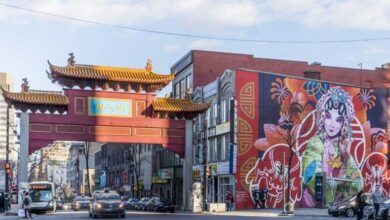
Montreal, a vibrant and diverse city, was recently jolted by a distressing incident of overnight violence that led to the tragic death of one person and injuries to two others. This unfortunate event has prompted local authorities to launch a thorough investigation into the circumstances surrounding the incident. While such incidents of violence sadly occur, this particular occurrence has sparked broader concerns about the excessive use of force by law enforcement against individuals from racialized backgrounds within the city. These concerns reflect a larger societal issue that demands attention, as communities grapple with the intersection of police violence and systemic racism.
Against the backdrop of this incident, Montreal faced a surge in violent crimes and carjackings during the year 2022. Notably, firearms emerged as a significant factor contributing to the escalation of armed violence, compounding the challenges faced by law enforcement in maintaining public safety. While instances of crime targeting individuals have risen, it’s important to note that many of these cases were categorized as assaults with limited impact on the victims. However, within this context, the disproportionate impact of such incidents on racialized communities is evident, necessitating a deeper examination of policing practices and their effects.
In the year 2022, Montreal found itself grappling with an unsettling escalation in violent crimes and carjackings, a disconcerting trend that cast a shadow of unease over the local community. The surge in criminal activity not only shattered the city’s sense of security but also posed a profound challenge to law enforcement agencies. Of particular concern was the prominent role that firearms began to play in these incidents of armed violence, injecting an added layer of complexity into the already intricate landscape of urban law enforcement[3]. As the incidence of criminal activities targeting individuals soared, the city’s residents were left understandably anxious about their safety and well-being.
Amidst these troubling developments, it’s important to acknowledge that while the rise in criminal incidents is undeniably distressing, a significant proportion of the reported cases were classified as assaults resulting in minimal harm to the victims. This nuanced perspective sheds light on the multifaceted nature of the situation, urging a comprehensive approach to address the underlying factors that contribute to both the surge in criminal activity and the instances of relatively less severe harm. Balancing the immediate need for enhanced security measures with a broader focus on preventive strategies remains crucial for restoring a sense of tranquility to Montreal’s neighborhoods.
Against this backdrop, it becomes imperative to address the disproportionate impact of these incidents on racialized communities. The province of Quebec’s police ethics commission has been receiving an average of 156 complaints annually over the last five years, specifically pertaining to racial profiling. These complaints constituted approximately seven percent of all the grievances lodged with the commission. However, it’s disheartening to observe that only a fraction of these complaints, merely 11, have progressed to the point of being deliberated by the police ethics committee. An even smaller subset, just four cases, led to disciplinary action against police officers involved. What’s particularly noteworthy is that more than half of these complaints were directed at the Montreal police force. This points to a systemic problem that necessitates substantial reforms to ensure fairness and equity in policing practices.
In a moment that left a lasting impact, a significant incident unfolded in December 2021. During this period, the police chief of Quebec City openly acknowledged a deeply concerning pattern: in each of the three videos released that week, depicting intense and violent confrontations, a solitary officer was consistently present. This alignment of circumstances served as an unfortunate yet powerful reminder, illuminating the pressing imperative for an immediate elevation in both police accountability and transparency, particularly when it comes to the application of force.
The incident underscored the critical necessity of holding law enforcement agencies to a higher standard of responsibility. It showcased the undeniable urgency for law enforcement to be acutely aware of their actions and the manner in which they engage with the public. The usage of undue and disproportionate force, particularly when wielded against individuals hailing from marginalized backgrounds, emphatically highlights the profound significance of reinstating faith and confidence within the community towards the police force.
In the aftermath of this pivotal event, the call for comprehensive reform resonates more powerfully than ever. Rebuilding trust between the law enforcement entities and the communities they serve requires concerted efforts in revising protocols, embracing de-escalation tactics, and instituting robust mechanisms for oversight. Only through a combination of tangible changes and transparent communication can the daunting challenge of restoring faith in the system be addressed, fostering an environment where every individual, irrespective of their background, feels secure, protected, and respected by those entrusted with maintaining law and order.
The recent episode of overnight violence in Montreal serves as a heartbreaking reminder of the pressing need to confront police violence and systemic racism entrenched within law enforcement. The incident underscores the necessity for continued and unwavering efforts to address these issues on multiple fronts. Accountability mechanisms need to be bolstered to hold police departments responsible for their actions and to ensure that justice is served in instances where misconduct occurs. Moreover, collaboration between law enforcement and communities is imperative to build safer neighborhoods and promote justice that is accessible to all.
The recent episode of overnight violence in Montreal serves as a poignant reminder of the complex issues surrounding police violence and systemic racism that persist in society. Beyond the immediate tragedy of the incident, it lays bare the need for ongoing efforts to address these challenges from multiple angles. The incident reinforces the urgency of fostering police accountability and transparency to bridge the divide between law enforcement and the communities they serve.
Montreal’s experience also emphasizes the significance of community collaboration in combating these issues. Strengthening the relationship between law enforcement agencies and the people they protect is paramount to cultivating an environment of trust and cooperation. Furthermore, the incident underscores the importance of robust accountability mechanisms that ensure responsible conduct among police officers. This includes not only addressing individual instances of misconduct but also confronting broader systemic problems that perpetuate inequalities.
In conclusion, the incident of overnight violence in Montreal serves as a poignant reminder that the road to a more equitable and just society is paved with challenges. As a society, we must commit ourselves to addressing these challenges head-on, with a shared determination to dismantle systemic racism and rectify unjust practices. By fostering transparency, accountability, and community engagement, we can strive to create a safer and more inclusive environment where all individuals are treated with dignity and respect, regardless of their background.



